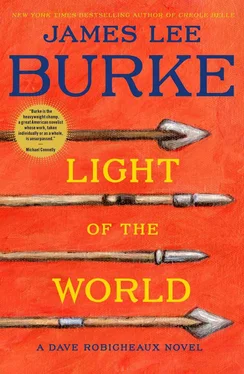“What’s the story on the Deer Heart family?”
“There aren’t many good stories on the rez. Check out the jail in Browning on Saturday night.”
A bell tinkled on the door when they went inside. The proprietor was an old man with steel-gray braids and blue eyes and skin that looked as soft as tallow. He said if they wanted to hire a car and a driver to tour and photograph the area, he would call his nephew, who lived a short distance away. Gretchen studied a framed photograph on the wall beside an ancient refrigerator. “Is this your family?” she asked.
“That’s us, ten years back. Ain’t many of us still around,” the old man said. He was sitting on a stool behind the counter, surrounded by shelves of canned goods, his shoulders stooped.
In the photo, several elderly people were standing under a picnic shelter. In front were a young couple and three small children. “Is Angel Deer Heart in this picture?” Gretchen asked.
“You know Angel?” the old man said.
“Just by name. She was adopted by the Younger family, wasn’t she?”
“Her mother and father were killed on the highway north of Browning. They got drunk and went straight into a truck. The children were taken by the adoption agency. Angel is the only one left.”
“Pardon?” Gretchen said.
“I heard her brother and sister died of meningitis in a hospital in Minnesota. You heard something about Angel? Is she doing okay?”
Gretchen didn’t answer.
“We don’t want to take a lot of your time,” Percy said. “Can you call your nephew for us?”
“If you ever see her, tell her to write home and tell her great-uncle Nap how she’s doing,” the old man said.
Gretchen looked blankly at the canned goods on the shelves. She opened the refrigerator and took out two bottles of pop. “How much are these?” she said.
“A dollar each,” he said. “Are you all right, miss?”
“I get airsick sometimes,” she replied.
She and Percy went out on the porch to wait for the nephew. A grass fire was crawling up a row of brown hills in the distance. The dust and smoke had turned the sunlight into pink haze, more like evening than morning. “You really think this place is haunted?” she said.
“That’s what the Indians want to believe.”
“Why should they want to do that?”
“As bad as the past was, they were probably better off then,” he replied.
A plane came out of nowhere and flew above the store and made a turn over the airstrip, then climbed into the smoke rising off the hills. “There’s our friend in the Cessna,” she said. “I think those are Love Younger’s people up there.”
“Forget it. We’re on the right side of history,” Percy said, watching the plane grow smaller inside the smoke. He looked at her. “You don’t agree?”
“The ovens at Auschwitz were full of people who were on the right side,” she said.
It was almost sunset when they landed in Missoula. She was tired and dirty, her clothes smelling of smoke, her body stiff from sitting in the plane’s passenger seat without enough room for her legs. Percy was going to refuel and take off for Spokane, where he was supposed to meet his partner. “Can I buy you dinner?” he said.
“I’m going to use the restroom and head home. Thanks for a great day.”
“If I ever decide to cheat on my partner, could I give you a call?”
“That’s not funny.”
“I don’t think before I speak sometimes.”
“Percy?”
He waited. She looked at the youthfulness in his face, the moral clarity in his eyes, and wanted to tell him something but didn’t know what.
“You worried about me?” he said.
“Sometimes I think I’m a jinx. Is your plane okay?”
“Did it seem okay when we flew through the canyon above the Marias?”
“Take care of yourself. Call me on my cell when you get to Spokane.”
“You’re a worrywart,” he said.
Later, on her way to use the women’s room, she felt rather than saw a man standing at the corner of her vision, his eyes dissecting her. It was a sensation she could compare only with a spider crawling across her face in her sleep as she lay helpless inside a dream from which she couldn’t wake. She shifted the weight of her backpack from one shoulder to the other, her expression flat, turning her head slightly to get a look at a figure silhouetted against the entranceway.
His face was shadowed by the sunlight shining through the front of the building. She pretended to study a stuffed grizzly bear in a giant showcase, its upraised paws and bared teeth looming above her. In the reflection of the glass, she watched the man walking toward the waiting room. She turned slowly and saw a late-middle-aged man about six feet, with a tapered waist and hair combed in ducktails like a 1950s hood’s. He wore an unpressed white shirt and Roman sandals and black socks and a cheap brown belt and rumpled slacks with dirt on the cuffs. A tobacco pipe was stuck through one of his belt loops. For just a moment she smelled an odor that didn’t belong inside an air terminal.
Then she lost sight of him in the concourse. He had gone into either the men’s room or the lounge. She walked through a crowd in front of the souvenir store and stood at the entrance to the lounge and studied the people eating at the tables or drinking at the bar or playing the video poker machines. If he was in there, she didn’t see him.
She waited in front of the men’s room for two minutes, then pushed the door open and went inside. A man at a urinal grinned at her. “One of us is in the wrong place,” he said.
She dropped her backpack on the floor and put a hand inside her tote bag. “You see a rumpled-looking guy with a duck ass in back?”
“A what?”
“Zip up and get out.”
A fat man came out of a stall, tucking in his shirt with his thumbs. “You, too,” she said. “Beat it.”
“Who do you think you are?” the fat man asked.
“I think there’s a bad guy in one of these stalls. Now get the fuck out, unless you want to catch a stray bullet,” she said.
Both men rushed out, looking over their shoulders at her. She walked the length of the stalls but saw no feet under the doors. She began kicking open each door, slamming it back against the partition, the Airweight .38 special in her right hand.
They were all empty. As she kicked open the last stall, an odor rose into her face that made her gag.
She backed away from the stall and blew out her breath and dropped the Airweight in her tote bag just as the front door opened and a tall man in a Stetson entered the room.
“Come on in. I went in the wrong room. I’m on my way out,” she said.
“No problem,” he said. He cleared his throat loudly and pressed the back of his wrist against his mouth. “Good Lord!” he said.
“Tell me about it,” she said. “You see a guy in Roman sandals with ducktails out there?”
“Come to think of it, I did.”
“Where?”
“Going out the front. Is there something a little strange going on here?”
She went back into the concourse, expecting to see security personnel heading toward her. The concourse, the souvenir shop, the waiting area, and the lines at the counters were as they had been when she entered the restroom.
She went through the revolving door onto the sidewalk. The air was warm, the sun little more than a spark between the hills, the clouds in the west orange against a blue sky. She felt a wave of exhaustion wash through her. Was the man with the 1950s hairstyle the same one she had seen at the bar in the Depot, the same one who had tried to kill her below the Higgins Street Bridge?
Was the abominable odor in the men’s room his? Was she losing her mind? She was too tired to answer her own questions. She started walking toward her pickup. Percy Wolcott’s twin-engine flew overhead into the sun’s afterglow, its propellers spinning with a silvery light, almost in tribute to the day. As the drone of the engines faded, she walked farther into the parking lot, the equipment in her backpack knocking against her side.
Читать дальше












